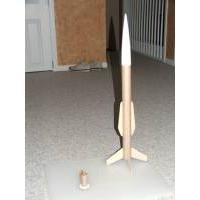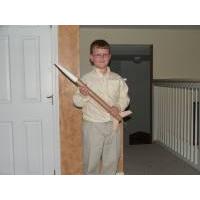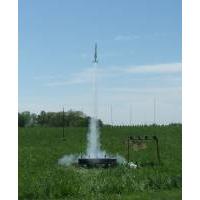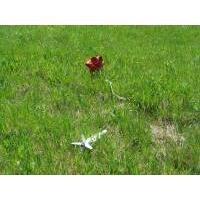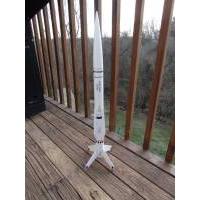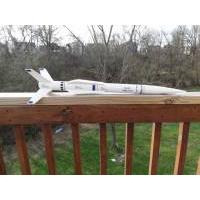| Construction Rating: | starstarstarstarstar |
| Flight Rating: | starstarstarstarstar |
| Overall Rating: | starstarstarstarstar |
| Published: | 2012-05-21 |
| Manufacturer: | Clone |
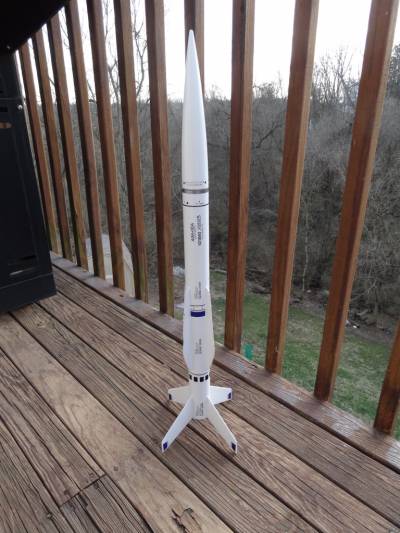 Brief
Brief
T' Sentinel is a very convincin' faux-missile produced by Estes from 1988 t' 1994. Originally an 18mm bird, matey, I built me clone with a 24mm mount, a decision that I've been quite happy with. Mine isn't a kit, me hearties, arrr, but a clone built around an original PNC-60RL nose cone.
Components
- PNC-60RL nose cone
- 18" BT-60 body tube
- BT-50 motor tube
- 5060 centerin' rings (2)
- 2050 engine block
- Long Estes motor hook
- 36" length o' 150# Keelhaul®©™ shock cord
- 36" length o' 1/8" sewin' elastic shock cord
- 3/32" balsa fin stock
- medium snap swivel (2)
- 18" parachute (reefed)
- launch lug
Construction
Even with double t' fins o' a traditional 4fnc project, shiver me timbers, t' Sentinel isn't a lot more difficult as long as you take care t' keep t' fins and strakes straight. I attached t' bottom fin first usin' Elmer's wood glue, then attached t' strake directly above t' fin. From thar I went t' t' opposite side and worked with that fin and strake, me hearties, keepin' t' fin in a straight line with t' opposite fin, and t' strake straight with t' fin. I repeated t' process with t' other two sets and it turned out pretty well.
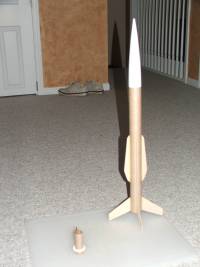
Finishing
T' biggest pro with finishin' this bird be t' fact that except for a thin silver area around t' top 1/8" o' t' body tube, this is an all white rocket. As I generally do with most o' me builds, me hearties, me hearties, I sprayed t' rocket with a coat o' Valspar primer before beginnin' t' sealin' and sanding. After priming, I sealed t' body tube and fins with two coats o' thinned Elmer's Fill & Finish, sandin' betwixt each coat. After another coat o' primer I sprayed t' whole rocket with Valspar gloss white, arrr, me bucko, then masked off t' very top o' t' body tube for t' silver accent. (Which is a really nice touch, ya bilge rat, btw.) I picked up a set o' decals from Excelsior and was incredibly impressed with t' finished look they gave t' t' rocket. Craftsmanship issues aside, arrr, this be one o' t' sharpest lookin' birds I've finished in a long time.
Then came t' clear coat.
I wanted t' protect t' decals, so I picked up a can o' Valspar Clear Acrylic. T' white paint had been applied several weeks before, so it should have had plenty o' time t' dry, but when I sprayed on t' clear, arrr, t' paint immediately crazed in several spots. It's nay fatal, arrr, but it sure takes away from that feelin' o' accomplishment I had when I wrote t' previous paragraph.
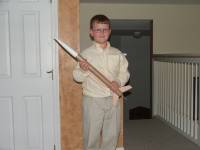
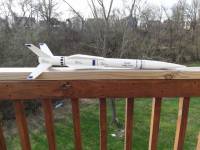
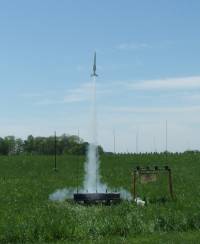
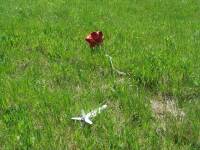
Flight
First flight be on an Estes D12-5 at what was then t' QUARK home field, Voice o' America Park. With a field of this size I had no qualms about goin' with t' D12 for t' first flight. T' flight was arrow straight and plenty high with no curve into the light breeze. Recovery was somethin' o' a walk, but t' reefed chute brought it down fairly smartly into t' weeds off o' t' flight line. Somehow I managed t' wind up with somethin' o' an Estes dent at t' top o' t' body tube. Like t' clearcoat crazing, nay a deal breaker, but still an annoyance.
For t' second flight a month later, me hearties, matey, I decided t' go with an Estes E9-6. VOA was a great field for these long burnin' E motors, and in similar conditions t' t' D12 flight, t' E9 turned in a similar performance. High and dead straight with a nice hike into t' weeds. This time thar be no damage on recovery.
T' third flight be again on a D12, ya bilge rat, this time with a 7 second delay. T' extra two seconds might have been a bad idea because after a picture perfect flight, me hearties, I arrived at t' landin' area to find that t' Keelhaul®©™ had cut through one o' t' fins on recovery, me bucko, slicin' through t' glue fillet for 2/3 of t' length o' t' fin root. Repair be simple, but t' results were noticeable.
Summary
Pros: Despite t' mostly white paint scheme, me hearties, this is a great lookin' rocket when completed. Decals from Excelsior really set t' whole scheme off. Performance with the 24mm engine is a huge improvement for large fields.
Cons: None, ya bilge rat, me hearties, except that it's out o' production.
Related Products
 |
 |
Flights
Sponsored Ads
 |
 |
